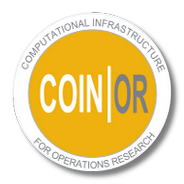COIN-OR Events at INFORMS Philadelphia
COIN-OR Cup Celebration
Join us as we celebrate this year’s winner of the COIN-OR Cup, the most coveted prize in computational Operations Research. This year’s celebration will take place Monday November 2nd at The Fieldhouse, 1150 Filbert St, just steps from the Marriott. The celebration begins at 8:30 pm!
COIN-OR Members and Users Meeting
As is traditional, we will have a Members and Users meeting during the lunch break on Monday November 2nd, 12:30 pm — 1:30 pm, in Marriott – Franklin 9, Level 4. Anyone interested in open-source software tools, open standards, or data and model repositories for any aspect of operations research is encouraged to attend. Bring your own lunch and ideas.
COIN-OR Booth
Visit the Computational Infrastructure for Operations Research booth (#10) to learn about high-quality, free, open-source tools for OR professionals and students, suitable for commercial, educational, and personal use. COIN-OR is the place to go when you need a ‘white box’ for algorithm research and development. We do binaries, too! We’re around the side, near the Career Centre.
Already familiar with COIN-OR and looking for something to do for half an hour til the next talk? Volunteers are always welcome to “staff the booth.” The COIN-OR booth is a great place to network with other COIN-OR community members, colleagues, and random members of the public.
